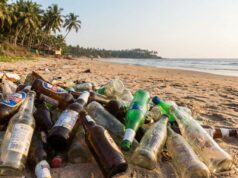Eight Goan children with disabilities were trained in water-based survival skills, thanks to Drishti Marine’s ongoing ‘Learn to Float’ initiative, a life-saving programme that aims to teach children the essential skill of floating, enhancing their water safety and providing a foundation for confidence and independence in aquatic environments.
The state-appointed lifesaver agency, Drishti Marine, has tailored its free-of-cost ‘Learn to Float’ programme under the aegis of the Marine Drishti Coastal Foundation and Goa-based Special Rescue Training Academy (SRTA), to cater to the needs of children with disabilities, imparting to them vital survival skills in water. It is a part of the lifesaving agency’s ongoing commitment to enhancing water safety and inclusivity at Goa’s beaches and water bodies, including community swimming pools.
The primary objective of this initiative is to equip children across Goa with the ability to float in emergencies, as floating helps keep them buoyant and calm, significantly increasing their chances of survival until help arrives.
This leg of the initiative was held at the Sethu Centre for Child Development and Family Guidance, Saligao, founded by developmental and behavioural paediatrician Dr Nandita de Souza, who reached out to Drishti Marine to conduct the programme for the children with disabilities under her ministrations.
“Playing in water is a fundamental element of enjoyment for children, who often head directly to water bodies as they are unaware of the dangers they pose without appropriate swimming or floating skills,” said Dr de Souza, the Centre’s director.
“Drowning is one of the most common causes of death among children with disabilities, especially those with autism. The ‘Learn to Float’ programme is a wonderful opportunity for our children and their families to get into the water and be trained by professional coaches in a very competent, respectful manner,” she added.
Parents, too, were extremely grateful that Drishti Marine tailored the programme to ensure that children with disabilities learned to float in a safe environment.
“At first, I was unsure that my child would be able to connect with the trainer and follow instructions. However, after four sessions, I was amazed that a great connection was forged between my child and the trainer, and he can now float correctly,” said Deepa Verekar, a proud parent.
Another parent, Zurica D’Souza, stated that while she was initially hesitant about sending her child for the programme as they were not comfortable with the thought of deep water, she was reassured by the lifesavers’ guidance and care.
“Very rarely do we get such initiatives like ‘Learn to Float’ where people offer to teach children with disabilities essential survival skills, that too, free of cost. My child is now so much more confident at floating and swimming,” said D’Souza.
Debanshu Das, Chief Training Officer, Drishti Marine, stated that the lifesavers ensured that each child with disabilities was given one-on-one training sessions over the course of six sessions, ensuring their comfort and safety.
“Our mission has always been to enhance water safety for all children, and this expansion to include children with disabilities is a significant step forward,” said Das. “Teaching children to float not only prepares them for emergencies but also builds their confidence, encouraging a positive and safe interaction with water,” he continued.
“Drishti Marine prioritises inclusivity, ensuring that every child is equipped with essential floating skills. The key to drowning prevention lies in education and preparedness, and we were happy that Dr Nandita from Sethu reached out to us to conduct this programme for children with disabilities,” emphasised Navin Awasthi, CEO, Drishti Marine.
The decision to extend the ‘Learn to Float’ programme to private locations across Goa comes in the wake of recent drowning incidents, especially involving children, reported in the swimming pools of some housing societies and residential enclaves in the state.






